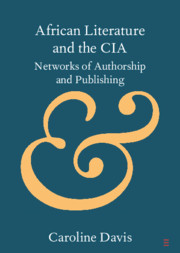Element contents
African Literature and the CIA
Published online by Cambridge University Press: 10 December 2020
Summary
Keywords
- Type
- Element
- Information
- Online ISBN: 9781108663229Publisher: Cambridge University PressPrint publication: 21 January 2021
Bibliography
Primary Sources
Secondary Sources
- 6
- Cited by

